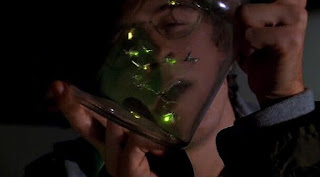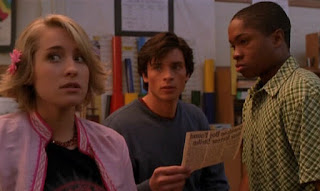Before I kick off the review, I'd just like to wish a very happy 20th anniversary to Smallville. This would've been up on the 16th, but computer issues delayed me for a bit. It's bittersweet, but it's the thought that counts.
Kristen Kreuk gets more time to shine as Lana Lang too. Lex Luthor visits her at the horse stables she frequents to drop hints that her boyfriend had been missing before the homecoming dance tormenting Clark and losing her meteorite necklace, which she confronts him about. Lex meanwhile gives Clark the necklace in a small lead box to give to Lana. She visits Clark in the barn loft, who's musing over how to return her necklace and having just discovered that lead shields him from kryptonite poisoning, and reveals that she discovered what Whitney has done and was surprised that Clark saved his life and that he kept the piece of the meteorite when her aunt made into a necklace on the day she adopted her. To her, the meteorite reminds that life is full of changes that are painful and beautiful, most of the time both. It's a really sweet scene that both plants the seeds for a very possible romance and shows Lana's heart and optimism that carries her.
The first episode of Smallville packed a punch, it was the perfect kickoff to a great Superman origin story and a lot of fun on its own, so it's nice to see that the second episode kicks ass too. I've heard, not read though, that showrunners Alfred Gough and Miles Millar are Spider-Man fans (they co-wrote the stunning Spider-Man 2 in 2004) so the idea of making Clark's foe a dark expy of the web-slinger is one that pays off big time. Picking up where the pilot left off, Lana Lang returns home from the homecoming dance and discovers a box of butterflies in her bedroom. It's almost enchanting until we see the moment being recorded by a very antisocial bug collector named Greg Arkin, a fellow student at Smallville High with a crush on Lana and propensity for voyeurism that puts Clark Kent's telescope spying to shame. Unfortunately for Greg, his mom finds the tapes and is having none of this creepy tomfoolery with bugs and stalking and signs him up for military school. Greg gets ahold of his bugs and high tails it out of there with his bugs in his Volkswagen beetle (haha) and blasting out "Last Resort" by Papa Roach (HAHA) and winds up crashing into a tree. His bug collection gets out and they begin biting him which, thanks to the green meteor rocks in the habitats, change Greg in a huge way.
I like to think he also listens to Alien Ant Farm.
And now the intro! For the first time we get an opening title sequence accompanied by "Save Me" by Remy Zero complete with clips from the show and superimposed footage of the stars. It's pretty spectacular, not much more to say about it, so I'll just show you.
Bitchin' isn't it?
The formula from here on out, more or less, is that Clark will have to face some kind of "freak of the week" on a Kryptonite-fueled power trip of some kind. I don't say this a negative though, Clark's guilt over the meteor shower and how he overcomes it on his journey to becoming the world's hero and it's a neat way of giving him some kind of adversity to overcome and a means of discovering his own powers. Greg is a particularly fun one, a stalker with a crush (wait, are we talking about Greg or the future superhero with a telescope aimed squarely at Lana's house?) with insect powers. Chad Donella does a fantastic job in both his nerdy, awkward persona and his cocky, violent persona once he's endowed with insect powers.
"Uh, I have mace."
The greatest strength, again, is the character-driven scenes. After a dream he has of flying into Lana's room and her telling him that her parents' death is his fault, he awakes and falls down onto his bed, breaking, and being called down. by his mother to do chores. Not only is a delight to see that he's capable of defying gravity (even by accident), it's also a powerful glimpse at the guilt he feels for the meteor shower that accompanied his arrival to Earth as an infant. At the farmer's market, Jonathan Kent congratulates Whitney on winning the big game, which has to hurt for poor Clark, who had just been strung up in a cornfield the previous night by the star quarterback and has been denied the chance to even play by his own dad, ouch. Whitney catches up with Clark and half-heartedly apologizes for stringing him up like a scarecrow before cutting to the chase, asking for Lana's kryptonite necklace back. Clark tells him he'd better go find it. Points to Clark for not immediately forgiving his tormentor and rival. Lex arrives too to check up on his new pal and takes note of Clark's crush on Lana. Meanwhile Lex checks up on Clark and takes note of his crush on Lana, quietly deciding to help him win her affections. It's never not fun to write about Clark and Lex's friendship. I haven't read the old Superboy comics of the 1950's, so I really don't know how they got along in that continuity and do feel free to grill me for that lack of knowledge, but this show does such a beautiful job with these two that I really wish it'd come into play more often in recent adaptations. We all know that the two become fierce foes with a legendary rivalry, but seeing them here as good pals is incredibly entertaining and the chemistry between Tom Welling and Michael Rosenbaum is almost adorable.
Lex Luthor is going to play matchmaker for Superman. Think about that for a moment.
Beginning with Greg's attack on Whitney and crashing his truck, the action really heats up. Clark saves his life and survives a fierce explosion that would have killed any normal human being. His parents are worried, but proud. This is where it becomes clear that the difference between Clark and his foes is that he doesn't see his incredible gifts as a means to an end or for his own gratification, but as a responsibility. Clark could conceivably rule the world with an iron fist, faster than a speeding bullet and virtually invulnerable, but instead he chooses to a protector. It would almost be schmaltzy without Tom Welling's conviction and charisma. Greg by contrast is a dangerous foe fueled by selfishness and vindictiveness. Spewing webs, leaping about and using strength that nearly rivals Clark, he's ruthless in his pursuit of Lana Lang to be his mate, even turning on his mother in a particularly creepy scene oozing with B-movie charm, not before molting out of his old skin first.
Sweet dreams, kids.
Lana Lang, not yet jaded by constant danger.
Can you tell which two I ship?
There's also an interesting tidbit we learn from Pete as they investigate, that Greg had an awesome treehouse that Clark could never stand because he's, get this, afraid of heights. That's a nice little touch for a character folks say is too bland and primarily known for flying around prompting folks to exclaim that's a bird, no, a plane, no it's Superman! But we have a long way to go before any gravity-defying feats of heroism so floating above his bed will have to do for now. It's an excellent second episode that keeps the ball rolling and gives fun new character developments to enjoy, but not revealing too much too soon.
Next time, Clark finally answers the call of football, pyrokinesis threatens his friends and we get our first look at the complicated life of Lex Luthor. Until next time, a belated Happy 20th Anniversary to Smallville.
Would you be willing to save your crush's boyfriend after he basically crucified you?
































.jpg)















